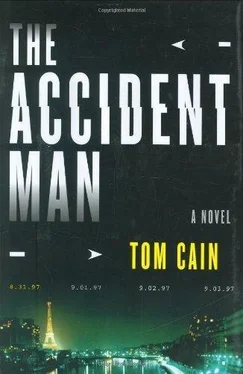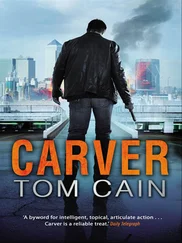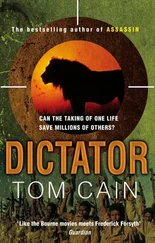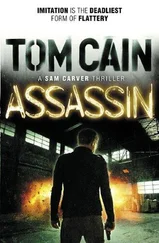Tom Cain - The accident man
Здесь есть возможность читать онлайн «Tom Cain - The accident man» весь текст электронной книги совершенно бесплатно (целиком полную версию без сокращений). В некоторых случаях можно слушать аудио, скачать через торрент в формате fb2 и присутствует краткое содержание. Жанр: Триллер, на английском языке. Описание произведения, (предисловие) а так же отзывы посетителей доступны на портале библиотеки ЛибКат.
- Название:The accident man
- Автор:
- Жанр:
- Год:неизвестен
- ISBN:нет данных
- Рейтинг книги:3 / 5. Голосов: 1
-
Избранное:Добавить в избранное
- Отзывы:
-
Ваша оценка:
- 60
- 1
- 2
- 3
- 4
- 5
The accident man: краткое содержание, описание и аннотация
Предлагаем к чтению аннотацию, описание, краткое содержание или предисловие (зависит от того, что написал сам автор книги «The accident man»). Если вы не нашли необходимую информацию о книге — напишите в комментариях, мы постараемся отыскать её.
The accident man — читать онлайн бесплатно полную книгу (весь текст) целиком
Ниже представлен текст книги, разбитый по страницам. Система сохранения места последней прочитанной страницы, позволяет с удобством читать онлайн бесплатно книгу «The accident man», без необходимости каждый раз заново искать на чём Вы остановились. Поставьте закладку, и сможете в любой момент перейти на страницу, на которой закончили чтение.
Интервал:
Закладка:
The accident man
Tom Cain
Prelude
The night air was weighed down with heat and the sea rippled lazily against the pebbled beach.
There was a guard on the wooden jetty, but it was past ten o'clock with no moon in the sky, so the man with the AK-47 did not see Samuel Carver as he swam beneath the Adriatic waters, didn't hear him as he surfaced beneath the jetty, didn't detect Carver's presence just beneath his feet.
Slowly, silently, Carver made his way up toward the shore, where the water was shallowest. He took off his mask, fins, and the buoyancy vest to which his breathing system was secured. He clipped the mask and flippers to D rings on the side of the vest, then gently slipped the diving gear back into the water, letting it settle on the seabed.
Carver waited till he heard the sound of the helicopter in the distance before he moved to his starting position by the foot of the ladder that led down to the sea at the deep end of the jetty. He was counting on human nature. When the chopper passed overhead, the man would look up. Anyone would, particularly if his boss was onboard.
There were two waterproof pouches strapped to Carver's thighs. As the noise of the rotors reached its clattering crescendo, he opened one of them and extracted a standard veterinarian's air pistol. He let the glow from the helicopter's landing lights pass overhead. Then he took a deep breath, gripped the side of the ladder, and pulled himself upward.
He landed flat on the planking and looked up to see the guard still watching the Bell 206B3 JetRanger as it hovered about four hundred meters away before dropping down to land at the villa's private helipad. The man's back made a perfect target for the tranquilizer dart. Carver dashed forward and caught the guard before he fell. He removed the dart and threw it into the water. Then he entered the estate, preparing himself for the job he had to do. Samuel Carver made very bad accidents happen to even worse people. His current target was a forty-three-year-old ethnic Albanian named Skender Visar. The official term for Visar's business was people-trafficking, but Carver preferred a more traditional job description. As far as he was concerned, the Albanian was a slave trader.
Visar shipped human beings in containers from China, Africa, and the former communist states of Eastern Europe. He sent men to work as indentured labor in fields and sweatshops, doing jobs that Westerners now felt were beneath their dignity. He bought women from families so impoverished they would sell their own kith and kin; he then beat them into submission, strung them out on drugs, and worked them mercilessly in the brothels, bars, and massage parlors he owned across Europe and the United States. Few slaves lasted more than two or three years. By then they had repaid the cost of their purchase, transport, and pitifully meager upkeep hundreds of times over. And there were always more, countless thousands more.
Slavery was crime's growth industry, its profits rapidly catching up with those to be made from illicit weapons and drugs. In some ways, the business model was far smarter. You could only sell a gun or a gram of cocaine once you could sell a sex slave ten times a night. But easy money bred tough competition. Visar lived in a permanent state of professional paranoia, constantly on the lookout for enemies, alert to every possible threat to his position, whether real or imagined.
He'd been taking a break on his 180-foot yacht, cruising the Dalmatian coast of Croatia with his family, when he heard that one of his senior lieutenants, Ergon Ali, had been trying to cut a deal with a rival boss. The information was false, planted to deceive, but it had the desired effect.
Visar sent a four-man team to the Berlin strip club that served as Ali's base. They knocked Ali unconscious with the butt of a Mossberg pump-action shotgun, bundled him into the trunk of an S-Class Mercedes, shot him full of heroin, and hit the autobahn south. Fourteen hours later they arrived in Split, the Croatian seaside town that had once been the favored summer resort of the emperors of Rome.
Visar's men topped up Ali's dose to keep him quiet, then drove their Merc onto the ferry to the island of Hvar, sticking it next to a camper van filled with Australian students on a round-Europe tour. They spent the three-hour voyage in the ferry bar, matching the Aussies beer for beer. The only other occupant of the bar was sitting in the corner, a bearded man in a battered Panama hat, with a pair of binoculars around his neck, eking out a pot of tea and studiously consulting a book about bird watching.
When Visar's men reached the villa, they dumped Ergon Ali, bound and gagged, in the cellar. They did not want to waste their boss's time, so they spent the rest of the night and all the next day beating, electrocuting, and half-drowning the man who had once been their friend. Only when they felt that Ali was about to crack did they call Skender Visar to inform him that everything had been prepared for his arrival. By the time Visar hung up, the blades on his helicopter had already started to turn. He was on his way to apply the finishing touches to Ergon Ali's interrogation. And Samuel Carver, bird watching now far from his mind, was waiting for him.
Carver crouched in the shadows to the side of the helipad. Visar and his bodyguard had already walked up the main house where Ergon Ali was awaiting his fate. The pilot stayed behind for a few minutes to shut down and check his aircraft, then he too made his way up the path. Carver waited until he was sure that the area was deserted, then slipped across the pad to the silent machine.
The Bell 206B3 is the workhorse of the skies, first put into service in 1967 and barely changed since. The rear of the aircraft consists of a long tail boom, at the end of which sit the tail rotor and the vertical stabilizer, which sticks out above and below the boom like the angled fins of a shark. This stabilizer is attached to the rest of the helicopter by four bolts, arranged in a rectangle.
Carver put on his gloves, took an adjustable wrench out of his second pouch, and removed the bottom two bolts. Then he used a minisaw to cut halfway through each one, making them significantly weaker. He screwed them back into the housing, taking extreme care not to snap them in two. Next he unscrewed the top pair of bolts, exactly as before. But this time he cut right through them, up by the head. He put the shafts back into his thigh pouch, then used tiny blobs of Blu-Tack to stick the heads of the bolts back on the vertical stabilizer, exactly where they had been before. An inch-by-inch inspection of the helicopter would reveal what Carver had done. But his work would certainly pass a tired pilot's cursory pretakeoff check.
He ran through the whole procedure one more time in his mind, making sure he had done everything that was required, and then made his way back to the jetty. By the time the guard woke from his slumber, Carver was long gone. Ergon Ali took a long time to die, protesting his innocence and loyalty to the end. It was dawn by the time Skender Visar got back onboard his helicopter. He was tired and preoccupied, fearing a dangerous, costly gang war and wondering who would be next to betray him. He wanted to get back to his boat. His pilot had no desire to anger him further, so he rushed through his takeoff procedures and got the Bell off the ground as fast as possible.
They were five miles out to sea when the vibrations started. The pilot's instincts told him to turn back, but he knew Visar would not allow it, so he picked up speed, hoping to get the trip over and done with as soon as possible.
As the helicopter accelerated, air started rushing ever faster around the vertical stabilizer, bullying it from side to side. If all four assembly bolts had been solidly in place, they would have kept the stabilizer upright and motionless. But with the top assembly bolts gone, the weakened bottom bolts became a hinge around which the stabilizer started to flap. And the more the pilot piled on the speed, the more extreme the flapping became.
Читать дальшеИнтервал:
Закладка:
Похожие книги на «The accident man»
Представляем Вашему вниманию похожие книги на «The accident man» списком для выбора. Мы отобрали схожую по названию и смыслу литературу в надежде предоставить читателям больше вариантов отыскать новые, интересные, ещё непрочитанные произведения.
Обсуждение, отзывы о книге «The accident man» и просто собственные мнения читателей. Оставьте ваши комментарии, напишите, что Вы думаете о произведении, его смысле или главных героях. Укажите что конкретно понравилось, а что нет, и почему Вы так считаете.












